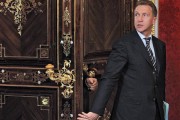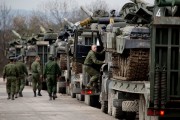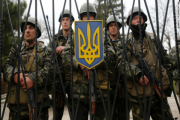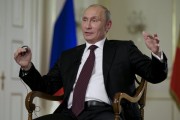From Fresher.ru:
Foreigners on the Russian Language
How foreigners perceive the Russian language.
The unusual sounds of foreign speech are often a reason for culture shock. In China or Vietnam, the sounds of the local language like “Siao-miao-liao” can completely drive us crazy. German speech of the sort “rosenkljajts rotenbertshmacher schteinblumenrichtenstadt” has a timbre and intensity that at times is reminiscent of Hitler’s election speech. But then how does our Russian language, so clear and natural, sound to foreigners? The answers are below.
Australia:
Russian sounds very brutal, masculine. It’s a very macho language. (Will, finance analyst, Australia)
Czech Republic:
For me, Russian sounds exactly like Polish. The exact same intonation, the exact same “feminine” pronunciation, in particular when compared to Czech. (Jakub, finance analyst, Czech Republic)
Great Britain:
For me, Russian speech is somewhere in between the roar of a walrus or a Brahms melody. (Abe, accountant, Great Britain)
Ireland:
Until I started learning Russian, and even for some time after I started Slavic studies lesson, it seemed more like a recording of any other world language played backwards. (Gethin, intelligence officer, Ireland)
The most amazing thing is that Russian can sound completely different: it all depends on who’s speaking and what’s being said. In principle, if you want, Russian can have an angelic sound. Really, really! Russian is a plasticine, which you can mould as you want. (Batyr, photographer, Mongolia)
New Zealand:
It’s as though someone hasn’t cleared their throat properly, and they have a mouth full of saliva while they’re trying to talk. (Dean, pensioner, New Zealand)
Netherlands:
The Russian language is the sounds that a cat would make if you put it in a box full of marbles: squeaks, squeal, and a complete mess. (William-Jan, designer, Netherlands)
USA:
I’ve always thought that Russian is a mix of Spanish with the trilled “r”, French, where they add the “je” sound and harsh sounds from German. (Jeremy, teacher, USA)
Italy:
It’s like a invitation to flirt desperately. And particularly when Russian girls in their incredibly sweet voice pronounce their “pachemu?” [Note: why?]. […] (Alessio, journalist, Italy)
Corsica:
It’s a very emotional language – Russians put lots of feeling and passion into their intonation. For example: “Vot eto da!” [Note: Wow!] (Chris, consultant, Corsica)
Germany:
Russian language is a couple of recognisable words lost in a complete linguistic chaos of ugly sounds. (Albertina, doctor of infectious diseases, Germany)
Great Britain:
It’s like the sound of sandpaper scraping on a rough surface covered with a thin layer of varnish. But if we’re talking about the provinces, their Russian is like sandpaper scraping on a rough surface without any varnish at all. (Mark, teacher, Great Britain)
Israel:
It’s like the roar of a bus stuck in traffic. “Da-da-daaaaaaaaaaaa”. And growing.
France:
The Russian language is like a very badly tuned radio – completely full of unnecessary rustles, crackles and creaks.
Comments from Fresher.ru:
Alex:
I once tried to explain to an American who was teaching us English what was a soft sign and what was a hard sign, but without success))
Tima: (responding to above)
Probably no-one would be successful))) English is really cut back and primitive, just like all the other languages indicated above. It’s impossible to explain what the colour of orange is to someone who was born blind)
Boss: (responding to above)
You’re the one that’s cut back and primitive.
In English, there are more than a million words.
I don’t know any other language with more words.
At the very least, there isn’t a richer language in Europe.
ГородНаНеве: (responding to above)
In terms of the number of words, perhaps, but in our language, you can read the same text with different intonations, and the meaning can be completely different. So you don’t need to chase after Russian here.
Марабу: (responding to above)
The main point is not the total number of words in a language, but the average number of words that are used in daily life (I’m not just talking about social conversation). In English, the daily “basis” is much poorer than in Russian, and you can quite easily understand by context and the construction of the phrase. In Russian, you can in no way guess by context if you don’t know precisely, and the sentence structure can be completely different, so that guessing is even harder.
Антон:
The Russian language is much richer and bigger than the primitive English language where all words have the same meanings for the same thing.
anna_sten:
This was interesting to read. I particularly liked what the Mongolian said, that Russian is like plasticine. That’s exactly the case :)
Денис:
More than anything I liked what the Mongolian said. And it’s true: in Russian, there is a very rich system of modifying words, as well as a huge quantity of synonyms.
But jargon and slang are just corrupting it. Nora Gal explains this better than anyone in her book “Living and Dead Words”.
Гостья:
Russian is beautiful, you can’t argue with that, but English, for me, as a linguist – it’s an insult to call it a “primitive” language, when there are as many as 26 tenses! Only someone who has never tried to improve their linguistic education beyond school level, and is not seriously interested in studying languages.







